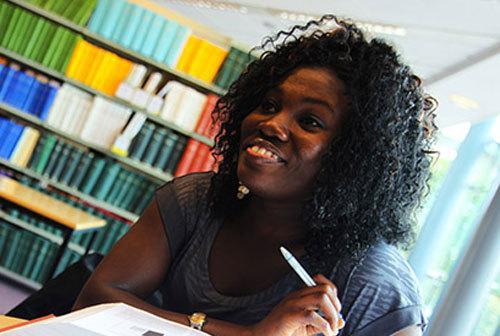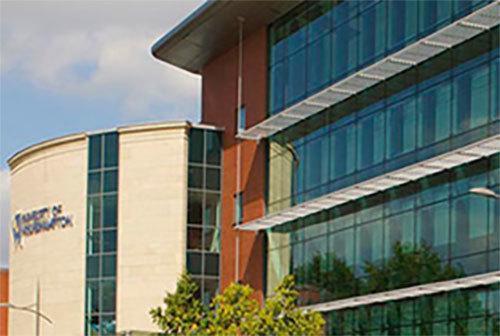(Wolverhampton | England )
University of Wolverhampton

O szkole University of Wolverhampton
The University of Wolverhampton has a long history of providing students with the opportunities presented by a first class education.
As a major player in the UK higher education sector, we continue to excel in the areas that have contributed to our excellent reputation: award-winning teaching, state-of-the-art facilities, international partnerships, strong business links and innovative research.
Our attractive offering to students includes:
300+ available courses
95% graduate employability*
partnerships with over 1000 businesses
14 Research Centres with elements rated as world-leading**
£45m campus investment over two years
outstanding facilities, including the multi-million Rosalind Franklin Science Building and Business School.
Today's modern University can be traced back to Wolverhampton’s Mechanics’ Institute and College of Art in the mid-1800s. These institutions, together with teacher training and health colleges that were later incorporated, developed our rich heritage and tradition of academic excellence in vocational higher education.
We continue to be guided by our coat of arms’ motto ‘Innovation and Opportunity’ by widening participation in education and offering an outstanding portfolio of courses that challenge students to realise their potential. The quality of our teaching and learning was praised recently when we received a commendation, the highest possible accolade, following the Quality Assurance Agency (QAA) 2015 review.
Our contributions to knowledge transfer, economic development, wealth creation and social justice position us as an active, pioneering institution on a local, national and global scale.
Our current offering is set to evolve even further as we aim to generate £250 million of investment by 2020, an ambitious strategy that will enable the introduction of new courses, improved facilities and innovative new ventures – all of which will create only more opportunities at the University of Wolverhampton.
Kursy
Angielski ogólny
0% Recenzje: 0
Ten kurs jest przeznaczony dla uczniów w wieku:: 16-70
Typ lokalizacji: Miasteczko uniwersyteckie
Poziomy: Poziom podstawowy, Średnio-zaawansowani
Godziny w tygodniu: Tryb intensywny 25+ godz./tydz.
UGCREDIT20 Pre-sessional English Language Skills Pre-Intermediate
Full-time (15 weeks)
The aim of this course is to develop students’ understanding and use of English Language in all 4 core skills (reading, writing, listening and speaking) to the equivalent of IELTS 5.5 so that they are able to start their next course of study. The course, as well as developing language skills, acquaints students with appropriate study skills and contextual knowledge regarding UK life and institutions.
-learning and practising the skills of reading, writing, listening and speaking in a wide variety of contexts
-performing the full range of tasks typical of those required to carry out successful academic study
-regular coursework involving practical language learning: error correction activities, individual, paired and group presentations
self-reflective activities [journals & portfolios]
-research into defined topic areas
-investigating grammatical details in context
Angielski - przygotowanie do egzaminu
0% Recenzje: 0
Ten kurs jest przeznaczony dla uczniów w wieku:: 16-70
Typ lokalizacji: Miasto, Miasteczko uniwersyteckie
Poziomy: Średnio-zaawansowani
The BA (Hons) English Language specialist degree draws together modules from the three related fields of English Language, Linguistics and Teaching of English to Speakers of Other Languages (TESOL).
Full-time (3 years)
Part-Time (5/6 years)
This degree offers you the chance to explore a wide range of language-related topics in a stimulating and challenging environment. The course gives you a solid grounding in linguistic theory as well as providing you with a detailed understanding of the nature of the English language and how it is used. You will acquire the sorts of analytical and communication skills required in the modern workplace and will gain the competence required to teach English to non-native speakers.
If you choose to take the TESOL placement module in your third year you may, at the end of your studies, have the opportunity to gain the Trinity College London Cert TESOL qualification.
Level 4: How English Works; How Words and Sentences are Formed; The Story of English; Language in Use; The Craft of Writing; Teaching English to Speakers of Other Languages (TESOL).
Level 5: Language and Society; Varieties of English; Working with Sounds and Words; Text, Context and Spin; TESOL.
Level 6: TESOL and Independent Study (project) plus choices from among the following modules: Gender, Sex and Language; Language Variation and Change; More about Words and Sentences; Communication, Culture and Power; Language and Humour; Language and the Mind; Work Placement Module in TESOL; Materials Design and Evaluation for TESOL.
Angielski - przygotowanie akademickie
0% Recenzje: 0
Ten kurs jest przeznaczony dla uczniów w wieku:: 16-70
Typ lokalizacji: Miasto, Miasteczko uniwersyteckie
Poziomy: Zaawansowani
Godziny w tygodniu: Tryb swobodny 10-15 godz./tydz., Tryb intensywny 25+ godz./tydz.
English Language and Linguistics
Full-time (3 years)
Part-Time (5/6 years)
The English Language modules that form part of this degree focus on textual analysis and on variation in language. At level one, students analyse the way meaning is constructed in texts and they also study the history of English. At levels two and three, emphasis is placed on language use in its social and cultural context. Students analyze diverse accents, dialects and world varieties of English, as well as looking at factors such as culture, class and gender. Students also examine the ways in which relations of power influence the production of texts in society.
The Linguistics modules address the fundamental concepts of language. Year one explores word and sentence structure, the sounds of language, second language acquisition, and important issues in applied linguistics. At level two, students look in greater detail at phonology/phonetics, morphology and syntax, as well as the constraints on language imposed by social context and stylistic choices. They also have the chance to study language meaning (i.e. semantic and pragmatic theory), and to take a language-based research methods module. Year three explores those aspects of structural and applied linguistics not previously covered, and includes a specialist module on language and the mind.
Broszury
-
Undergraduate-Prospectus-2016-17.pdfPDF | 6MB dodane 12.10.2015 Ściągnij




